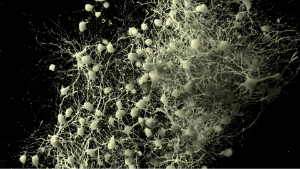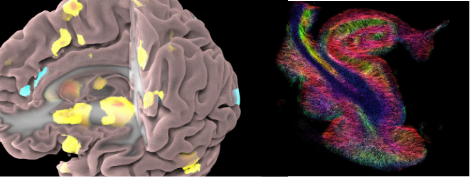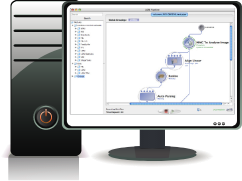The USC Mark and Mary Stevens Neuroimaging and Informatics Institute applies innovative imaging and information technologies to the study of the brain. Our interdisciplinary team investigates brain structure, function and disease, using techniques such as mathematics, genomic analysis and ultra-high-field MRI scanning. Directed by Provost Professor Arthur W. Toga, the institute is housed within Stevens Hall of Neuroimaging, a dedicated, custom-built facility at the Keck School of Medicine of USC.
The USC Mary and Mark Stevens Neuroimaging and Informatics Institute, founded in 2013, builds on more than three decades of expertise in neuroimaging research.

INI's four centers, the Laboratory of Neuro Imaging (LONI), the Imaging Genetics Center (IGC), the Center for Image Acquisition (CIA), and the Center for Integrative Connectomics (CIC), address discovery needs across the spectrum of neuroscience.
Explore some of our larger national research projects:



Laboratory of Neuro Imaging Resource (LONIR)
The Laboratory of Neuro Imaging Resource (LONIR) develops, optimizes and shares innovative solutions for the investigation of imaging, genetics, behavioral, and clinical data. Among other activities, the LONIR team develops and shares algorithms for processing imaging data and hosts training seminars for students and early-career professionals. Learn More
Parkinson’s Progression Markers Initiative (PPMI)
The Parkinson’s Progression Markers Initiative (PPMI) is the Michael J. Fox Foundation’s flagship longitudinal biomarkers study, follows more than 1,000 research participants in 33 clinical sites worldwide. One important product of the study is a shared database where researchers can access a repository of imaging, clinical, and behavioral data, as well as biospecimens. Learn More
Big Data for Discovery Science Center (BDDS)
Part of NIH’s Big Data to Knowledge (BD2K) initiative, BDDS unites experts in biomedical imaging, genetics, proteomics, and computer science using big data approaches. BDDS sponsors training seminars and provides researchers with access to its Knowledge Discovery Interface, an intuitive training system comprising lectures, tutorials, and other educational material. Learn More
Epilepsy Bioinformatics Study for Antiepileptogenic Therapy (EpiBioS4Rx)
The institute's researchers helped form this international, multi-center collaborative effort to understand and treat epilepsy by studying animals and patients with traumatic brain injury. Learn More
Mouse Connectome Project (MCP)
Funded by NIH, this project aims to create a connectivity atlas of the mouse brain, mapping its neural networks and investigating the way various regions communicate with one another to influence behavior. Learn More
Epilepsy Bioinformatics Study for Antiepileptogenic Therapy (EpiBioS4Rx)
The institute's researchers helped form this international, multi-center collaborative effort to understand and treat epilepsy by studying animals and patients with traumatic brain injury. Learn More
Data Archive for the BRAIN Initiative (DABI)
DABI is a shared repository for invasive neurophysiology data collected by NIH BRAIN Initiative researchers. The web-accessible data archive allows researchers to organize, store, disseminate, analyze and visualize human invasive neurophysiology data such as EEG, ECoG and LFP. Learn More
Alzheimer’s Disease Neuroimaging Initiative (ADNI)
Now active for more than 15 years, ADNI is a longitudinal, multicenter public-private partnership that aims to develop clinical, imaging, genetic and biochemical biomarkers for the early detection and tracking of Alzehimer’s disease. Its data has fueled hundreds of AD studies. Learn More
Global Alzheimer’s Association Interactive Network (GAAIN)
GAAIN, a revolutionary way of pooling and sharing Alzheimer’s disease data, is advancing research into the causes, prevention and treatment of AD. The platform’s analysis tools and federated network allow researchers to find data while protecting the privacy of subjects and data collectors. Learn More
BRAIN Initiative Cell Census Network (BICCN)
The institute’s researchers are working to define and classify neural cell types in the mouse brain, which will pave the way for researchers to selectively manipulate circuits and develop cell-type specific therapeutics for neurological diseases. Learn More
At the INI, we are a multidisciplinary group by design. We draw expertise from a diverse range of fields including neuroscience, medicine, engineering, computer science, physics, epidemiology, biotechnology and more.

Our team of more than 125 faculty, staff and students operates from an integrative physical and virtual space that cultivates powerful trans-disciplinary partnerships. Learn More

Mapping the Brain
We're using advanced imaging technologies and techniques to help create the most detailed map of the brain's connections to date.

Understanding Disease
By combining data from clinical, behavioral, genetics, and imaging studies, we seek to answer key questions about what can go wrong in the brain and learn how to prevent or reverse the damage.

Developing Shareable Tools
We design our experimental protocols, software, and analytical tools to be shared with the larger research community. Our team has also helped revolutionize data sharing by creating public archives that facilitate worldwide collaboration.

Training New Leaders
Our one-year M.S. program in Neuroimaging and Informatics prepares scientists for rewarding careers in biomedicine. We also offer a series of workshops, seminars, and online educational tools to train researchers in the latest imaging and informatics technology.